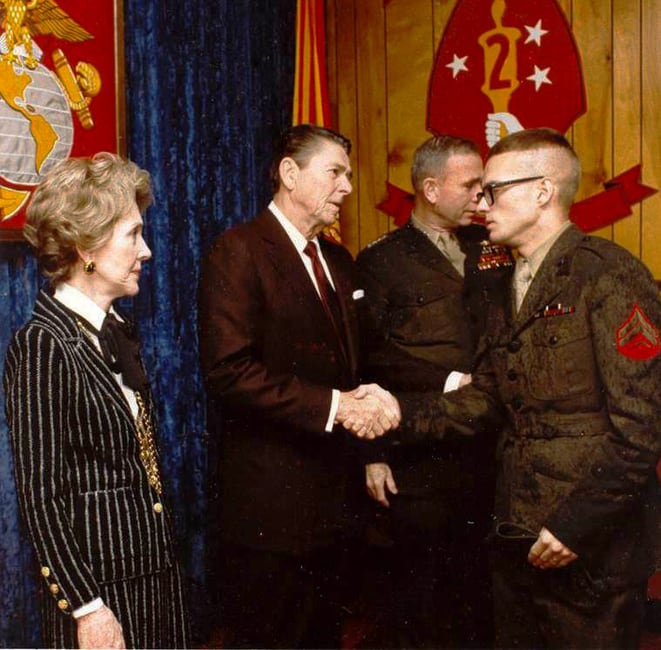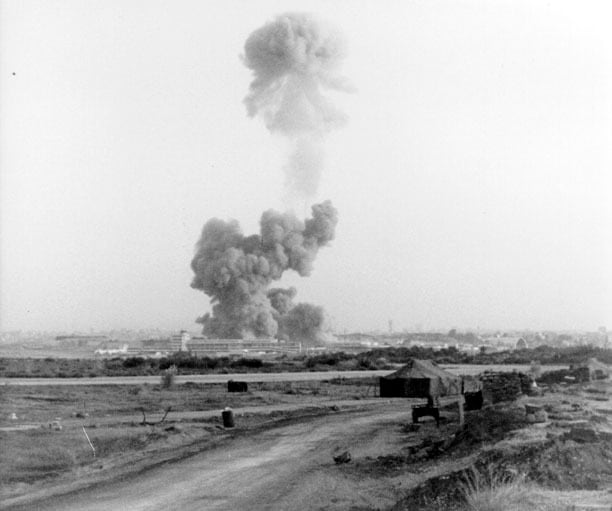BRUNSWICK, Ga. — Few Americans these days can readily recall what happened on Oct. 23, 1983.
Ed Brown can never forget. Standing on the shaded side of the Friendly’s Express on Blythe Island Highway to escape Wednesday’s midmorning heat, Brown took a moment to explain why we all should remember.
"It was a peacekeeping mission, but we became a target," Brown said. "We were subject to one of the first terrorist attacks on Americans."
The 22-year-old Navy corpsman was assigned overnight to the sick bay for a U.S. military outpost in Beirut, Lebanon. The truck loaded with explosives and driven by a fanatic on a suicide mission barreled into the nearby Marine barracks around 6:20 a.m. on that Sunday morning, catching most still in slumber.
"I was asleep on a stretcher on sick call in case anybody came in overnight," Brown said. "The explosion blew me out of the rack and onto the floor, about a 3-foot drop. We were 100 yards from the barracks. Everybody was sleeping."
The deadly terrorist attack killed 241 servicemen, including 220 Marines, 18 sailors and three Army soldiers.
Not since the Battle of Iwo Jima during World War II did the U.S. Marines suffer a more devastating single-day death toll. It marked the largest single-day loss of U.S. servicemen since the Vietnam War’s Tet Offensive.
A group identifying itself as the Islamic Jihad claimed responsibility for what is considered among the first terrorist attacks on Americans.
After guzzling down a cold sports drink and refreshing his water bottles, Brown stepped back out into the blazing sun. He began walking north on Blythe Island Highway, headed for a stopover for the day on the grounds of Boatright and Associates along U.S. Highway 17 in Glynn County. His ultimate destination is Jacksonville, N.C., home of Marine Corps Base Camp Lejeune.
Brown, 57, aims to complete the trek by Oct. 22, arriving in time for the next day's ceremony commemorating the 35th anniversary of the Beirut bombing. To make it, he plans to walk an average of 24.1 mile per day, symbolic of the 241 servicemen who died in that attack. His 30-pound backpack is flanked by an American flag and a Beirut Memorial flag and contains the tent he will pitch and stops along the way.
Brown began the journey Monday in Jacksonnville, Fla. The walk also is raising money for the Beirut Veterans Scholarship Fund through his Facebook page.
"I am doing this in honor of the 241 families who lost their sons, brothers and fathers," said Brown, a retired Navy veteran now living in Milton, Fla., near Pensacola. "All these national events, Veterans Day, Memorial Day, they never recognize Beirut. The purpose of this journey is to recognize the families."

One place those families are not forgotten is Jacksonville, N.C. The barracks attacked that day in Beirut housed members of the 1st Battalion, 8th Marines, who were deployed from Camp Lejeune. A large memorial there commemorates those who died in the attack and is inscribed in large letters with a reminder that “They Came In Peace.”
The soldiers were part of a multinational peacekeeping force, sent to Lebanon amid rising tensions among Muslim and Christian factions during a tense civil war. Fifty-eight French paratroopers also died from a second suicide bomber's truck attack.
After the initial shock of the explosion that rocked Brown from his slumber, he quickly assumed his duties as a corpsman, or medic. He and a fellow corpsman rushed to what moments earlier had been a large concrete building.
"We took off running toward the building," he said. "It was just gone. It was nothing but concrete dust, rubble and dust. We treated several casualties, or attempted to. Some were untreatable."
Brown was the first to reach Staff Sgt. Steve E. Russell, who was on watch and managed to shout warnings to fellow Marines before suffering multiple injuries.
"I went to Sgt. Russell and treated him," Brown recalled. "He was laying in a pile of rubble with his legs busted up."

Glynn County firefighter Craig Renshaw also remembers that day with stark clarity. The young Marine machine gunner had just gotten off duty at a bunker guarded airport — about 600 yards from the barracks — when the attack occurred.
Renshaw met Brown on Tuesday near Kingsland in Camden County, toting his 30-pound backpack in his pickup and providing him with water for his journey into Glynn County. Like Brown, Renshaw is a member of the Beirut Veterans of America. Like Renshaw, he plans to be on hand Oct. 23 for the solemn ceremony at the Beirut memorial in Jacksonville, N.C.
“We want to remember our brothers and their family members,” Renshaw said. “To me it’s just a matter of honoring the guys that have sacrificed for the freedom of this country. America should be able to stop and acknowledge the service men or women of this country have done to keep it free.”




